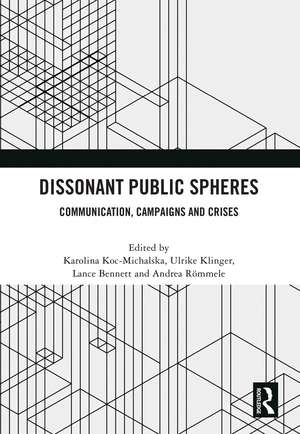Dissonant Public Spheres: Communication, Campaigns and Crises
Editat de Karolina Koc-Michalska, Ulrike Klinger, Lance Bennett, Andrea Rommeleen Limba Engleză Hardback – 30 aug 2024
The volume approaches the concept of dissonant public spheres from four divergent perspectives: as instrumental threats to democracy, as communication performed by political actors, forms of engagement by citizens, and the nature of political conflicts. New perspectives are developed on how political candidates, organizations, and parties optimize their behaviour within dissonant political environments. These disrupted online communication environments reshape public spheres and change citizen engagement in ways that amplify political conflicts and crises. Chapters also examine the role of data-driven campaigning and address how limited access to platform data affects our understanding of dissonant public spheres.
A significant new contribution to the field of political communication, this volume will be a key resource for scholars and researchers of communication studies, politics, media studies and sociology. The chapters in this book were originally published in Political Communication.
Preț: 952.31 lei
Preț vechi: 1161.35 lei
-18% Nou
Puncte Express: 1428
Preț estimativ în valută:
182.23€ • 191.62$ • 150.57£
182.23€ • 191.62$ • 150.57£
Carte tipărită la comandă
Livrare economică 16-30 aprilie
Preluare comenzi: 021 569.72.76
Specificații
ISBN-13: 9781032766539
ISBN-10: 1032766530
Pagini: 240
Dimensiuni: 178 x 254 x 20 mm
Greutate: 0.64 kg
Ediția:1
Editura: Taylor & Francis
Colecția Routledge
Locul publicării:Oxford, United Kingdom
ISBN-10: 1032766530
Pagini: 240
Dimensiuni: 178 x 254 x 20 mm
Greutate: 0.64 kg
Ediția:1
Editura: Taylor & Francis
Colecția Routledge
Locul publicării:Oxford, United Kingdom
Public țintă
Postgraduate, Undergraduate Advanced, and Undergraduate CoreCuprins
Introduction – Dissonant Public Spheres: Communication, Campaigns and Crises 1. Conditions of Campaigning in Dissonant Public Spheres and Crisis of Democracy 2. Data-Driven Campaigning as a Disruptive Force 3. The Data Abyss: How lack of data access leaves research and society in the dark 4. Farewell to Big Data? Studying Misinformation in Mobile Messaging Applications 5. Cross-Platform Emotions and Audience Engagement in Social Media Political Campaigning: Comparing Candidates’ Facebook and Instagram Images in the 2020 US Election 6. Are Campaigns Getting Uglier, and Who Is to Blame? Negativity, Dramatization and Populism on Facebook in the 2014 and 2019 EP Election Campaigns 7. Damage Control: How Campaign Teams Interpret and Respond to Online Incivility 8. Dissonance from the Perspective of Agonistic Pluralism: A Study of Political Fragmentation on Facebook during the 2016 Austrian Presidential Election 9. The Campaign Disinformation Divide: Believing and Sharing News in the 2019 UK General Election 10. Abating Dissonant Public Spheres: Exploring the Effects of Affective, Ideological and Perceived Societal Political Polarization on Social Media Political Persuasion 11. Broadcasting Messages via Telegram: Pro-Government Social Media Control During the 2020 Protests in Belarus and 2022 Anti-War Protests in Russia 12. Political Polarization on the Digital Sphere: A Cross-platform, Over-time Analysis of Interactional, Positional, and Affective Polarization on Social Media
Notă biografică
Karolina Koc-Michalska is Professor at Audencia Business School and Affiliated Researcher at CEVIPOF Sciences Po Paris, France, and University of Silesia, Poland. She is part of the NEPOCS group (nepocs.eu). She studies the strategies of political actors in the online environment and citizens’ political engagement. She employs a comparative approach focusing on the United States and European countries.
Ulrike Klinger is Professor for Digital Democracy at the European New School of Digital Studies, European University Viadrina, Frankfurt (Oder) in Germany. Her research focuses on digital political communication, technology and democracy, and the transformation of public spheres.
Lance Bennett is Senior Research Fellow, Center for Journalism, Media & Democracy at the University of Washington, Seattle.
Andrea Römmele is Dean of Executive Education and Professor of Communication in Politics and Civil Society at the Hertie School. Her research interests are comparative political communications, political parties and public affairs.
Ulrike Klinger is Professor for Digital Democracy at the European New School of Digital Studies, European University Viadrina, Frankfurt (Oder) in Germany. Her research focuses on digital political communication, technology and democracy, and the transformation of public spheres.
Lance Bennett is Senior Research Fellow, Center for Journalism, Media & Democracy at the University of Washington, Seattle.
Andrea Römmele is Dean of Executive Education and Professor of Communication in Politics and Civil Society at the Hertie School. Her research interests are comparative political communications, political parties and public affairs.
Descriere
This book covers various aspects of political communication in dissonant public spheres and their impact on democratic processes.The chapters in this book were originally published in Political Communication.
